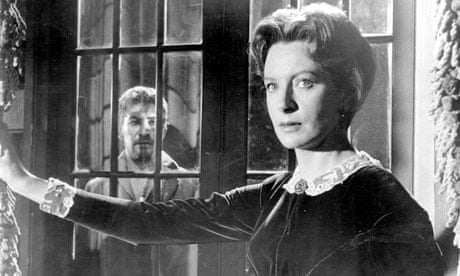Such a story is tough to bring to the silver screen; and thus the production team behind The Innocents tried to avoid this initial obstacle, perhaps, by choosing to adapt their screenplay more directly from the stage play of the same name, rather than the original source novella. They needn't have worried if that was the case. Jack Clayton's masterful 1960s horror never pigeonholes itself as either a gothic or psycholcial horror; it's a bit of both really, and Clayton and the film's screenwriters William Archibald and Truman Capote (!!) have a bit of a fun with both sides in bringing James' tale to life.
The film begins with one of the most beautiful, unnerving and minimalist credit sequences ever. Beginning with a blank, black screen with an overture of 'O Willow Waly', that somehow manages to unnerve with so very little, we technically begin in medias res but it is sort of obscured from our awareness; the theme to The Innocents by Georges Auric is both at once creepy and somewhat childlike and...innocent. It sets the tone perfectly and makes you want to watch on, even though the initial few scenes of The Innocents may seem like fairly standard sort of 'set up' for your typical horror film.
The unnamed narrator of The Turn of the Screw is given a name here, as well as one of the greatest actresses in film history, and my personal favourite actress of all-time, Deborah Kerr, to play her. Kerr was actually close to forty when filming The Innocents yet never feels miscast as the a character implied to be in her early twenties in the novel. Always the queen of expressive eyes and physically emotive states, Kerr makes Miss Giddens both a slightly more mature, more experienced figure than we've come to expect with similar sorts of characters, yet there's also a very childlike nervousness and rectitude to her. Kerr simply fits the role perfectly, bringing a very particular, old-fashioned style to her governess figure while blending it perfectly with a disposition more fitting to a timid, scared young girl, who's about to be plunged into an environment far beyond her control.
The orphaned nephews of the wealthy Uncle (a curiously tiny role for Michael Redgrave) she is sent to take care of in question, Miles (Martin Stephens) and Flora (Pamela Franklin), are not all that off-putting initially, nor are they meant to be. You're meant to see them first as just normal kids, Miles being the slightly more troublesome, and cheeky sort of lad, and Flora the more naturally endearing and sweet sort. Franklin's performance as Flora is one which draws appreciation from me upon every re-watch. She's very charming and makes you really enjoy every moment her jolly face and youthful exuberance permeates onscreen, which makes the subsequent revelations of the film all the more jarring; her breakdown scenes at the interrogations of Miss Giddens are incredible scenes, as Franklin shows an incredible amount of visceral power that would make most actresses that age crumble. She holds her own incredibly well in, far as I'm concerned, the greatest actress of old Hollywood, and that she was a mere 11 years old when this film was released is just amazing.
The subject of the interrogations is ghosts, of course, ghosts that are apparently haunting the estate, of the deceased, decadent valet Quint (Peter Wyngarde) and the previous governess Miss Jessel (Clytie Jessop). The handling of the supernatural elements is of course, subdued, extremely subtle, because like the source material, whether the ghosts are actually there, or whether they're the byproduct of Miss Giddens' twisted imagination, is never explicitly made clear even towards the harrowing end. The ambiguities could have fallen completely flat, but they don't on two accords. The screenplay never cheats and gives a fair and balanced possibility to both perspectives without compromising the effects of either the supernatural or psychological horror. And Kerr's performance, of course, balances perfectly the two sides of Miss Giddens, utterly compelling and convincing in her fear of the ghosts, and also suggesting a mental imbalance in the margins that would lend credence to the alternative interpretation of the character.
The lighting in the film is magnificent, and manages to make the nighttime scenes in the mansion (the use of illuminating candlelight being particularly effective) as suspenseful as the daytime sequences where we get iconic images like the hazy figure of 'Quint' on the tower top, or Miss Jessel standing by the reeds in the mansion's lake. Freddie Francis' cinematography is stunning as he captures such a particular sense of horror. Not that of the grotesque variety, necessarily, but of a terrifying beauty to be found in every corner of the household. You can't bear to look away since it's all so beautifully filmed, and at the same time the underlying horror of the screenplay and direction makes you fear every second.




Excellent review. Such a great film which perhaps should be the standard all ghost movies should be held to. I especially love how it shows that even with minimalist, or actually even non-existent visual effects, without violence or even a direct monster, a film can be still be quite terrifying.
ReplyDeleteBrilliant movie! Kerr was amazing.
ReplyDelete